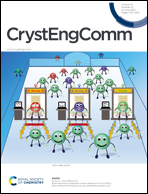Synthesis and investigation of alkaline energetic coordination polymers based on 1,2,3-triazole-4,5-dicarboxylic acid for green component of pyrotechnics†
Abstract
Research on novel energetic coordination polymers (ECPs) has become increasingly important for energetic materials; numerous ECPs have been reported and found to be potential energetic materials. In this study, 1,2,3-triazole-4,5-dicarboxylic acid was synthesized by an innovative synthetic route, and its complexes with alkali metals (Li, Na, K, Rb, Cs) were synthesized and comprehensively characterized by single-crystal X-ray diffraction, elemental analysis, FT-IR and mass spectra. Most of the synthesized complexes exhibit excellent thermostability, with decomposition temperatures ranging from 312 to 334 °C, and they show good experimental densities. Additionally, the non-isothermal kinetic parameters and thermodynamic parameters were calculated for all prepared ECPs. The combustion flames of the five complexes are in a range of characteristic flame colors (from purple-red to blue). At the same time, all the synthesized CPs have remarkable insensitivity toward friction and impact (FS > 360 N, IS > 40 J), which makes them promising component candidates for chlorine-free “green” pyrotechnics.



 Please wait while we load your content...
Please wait while we load your content...